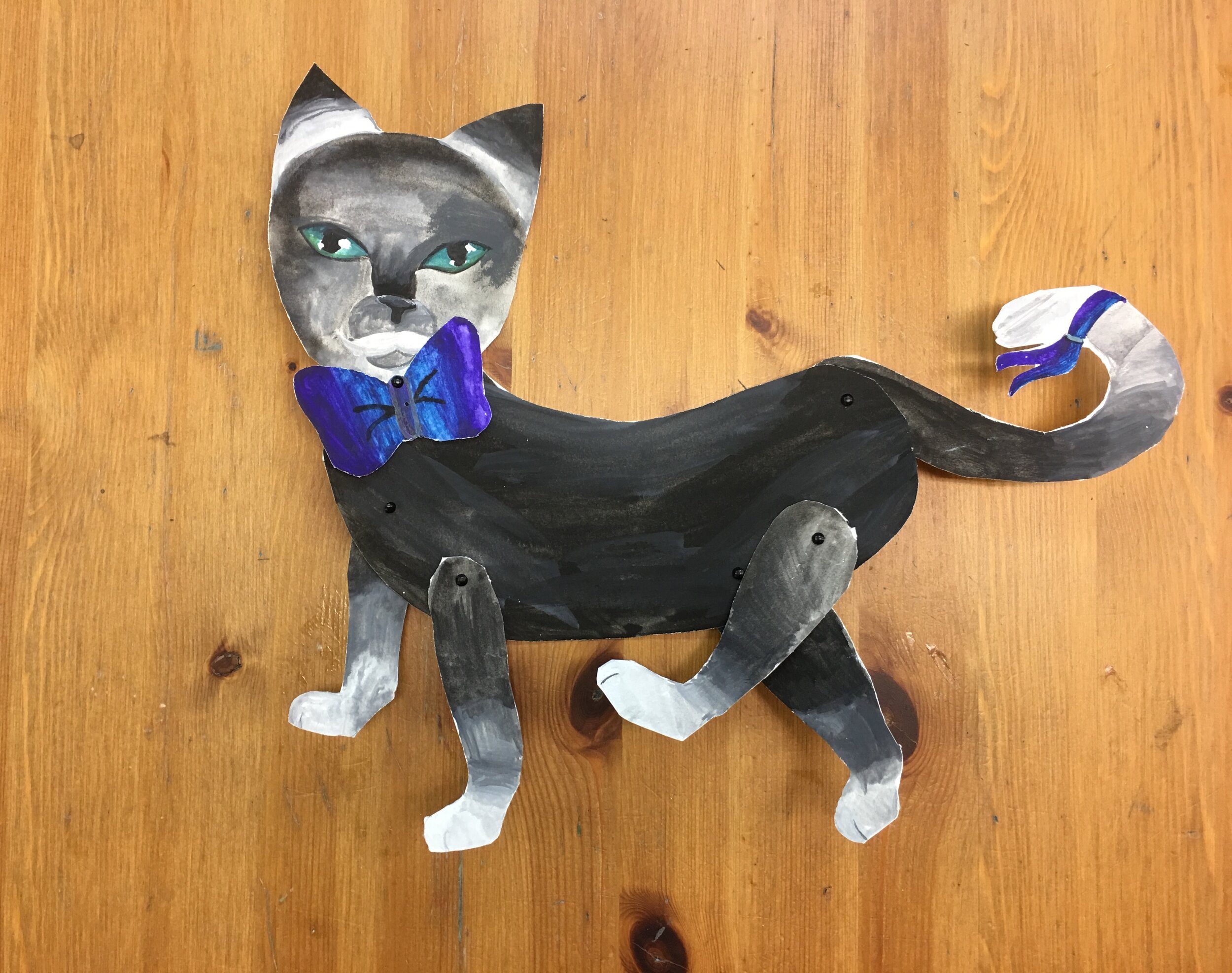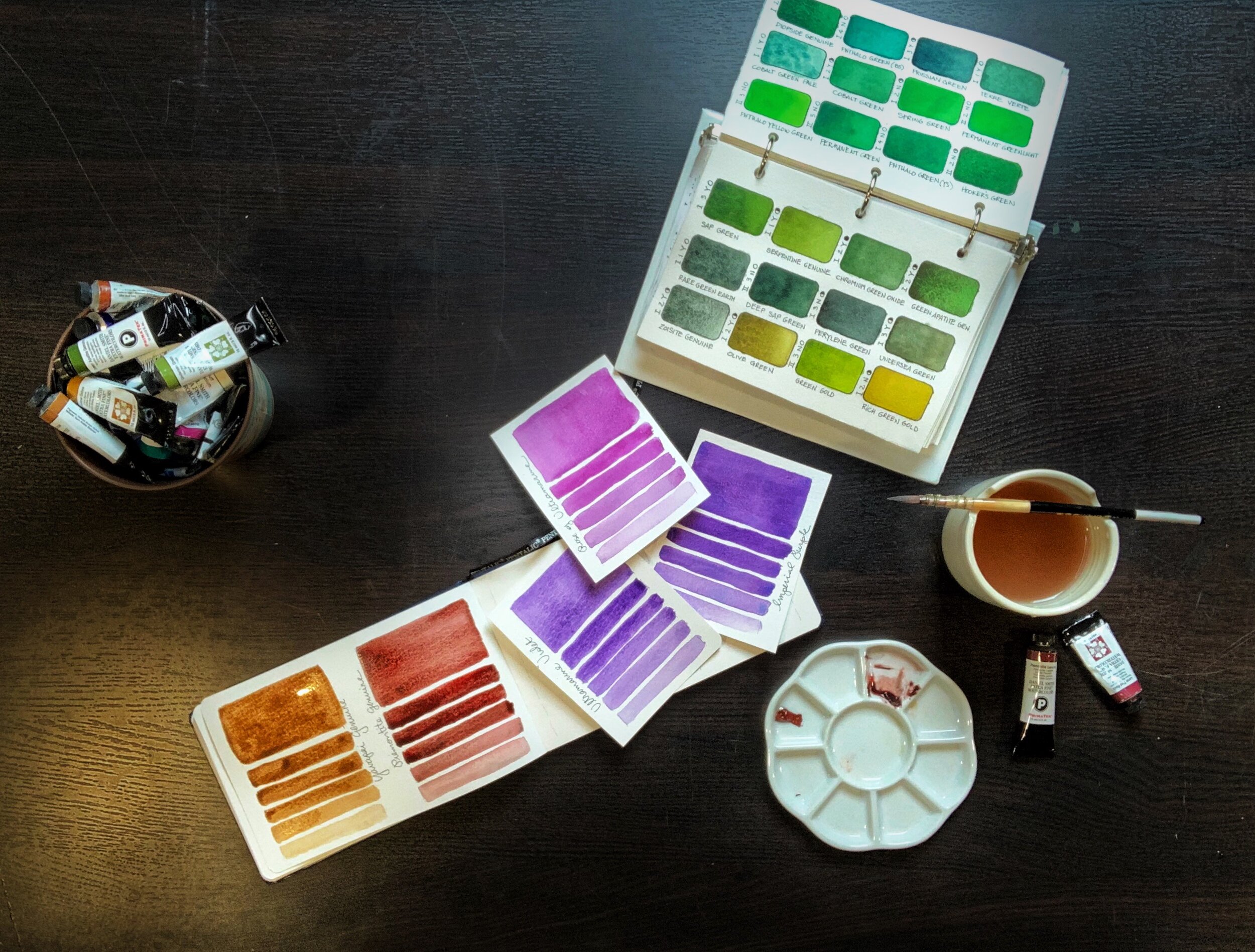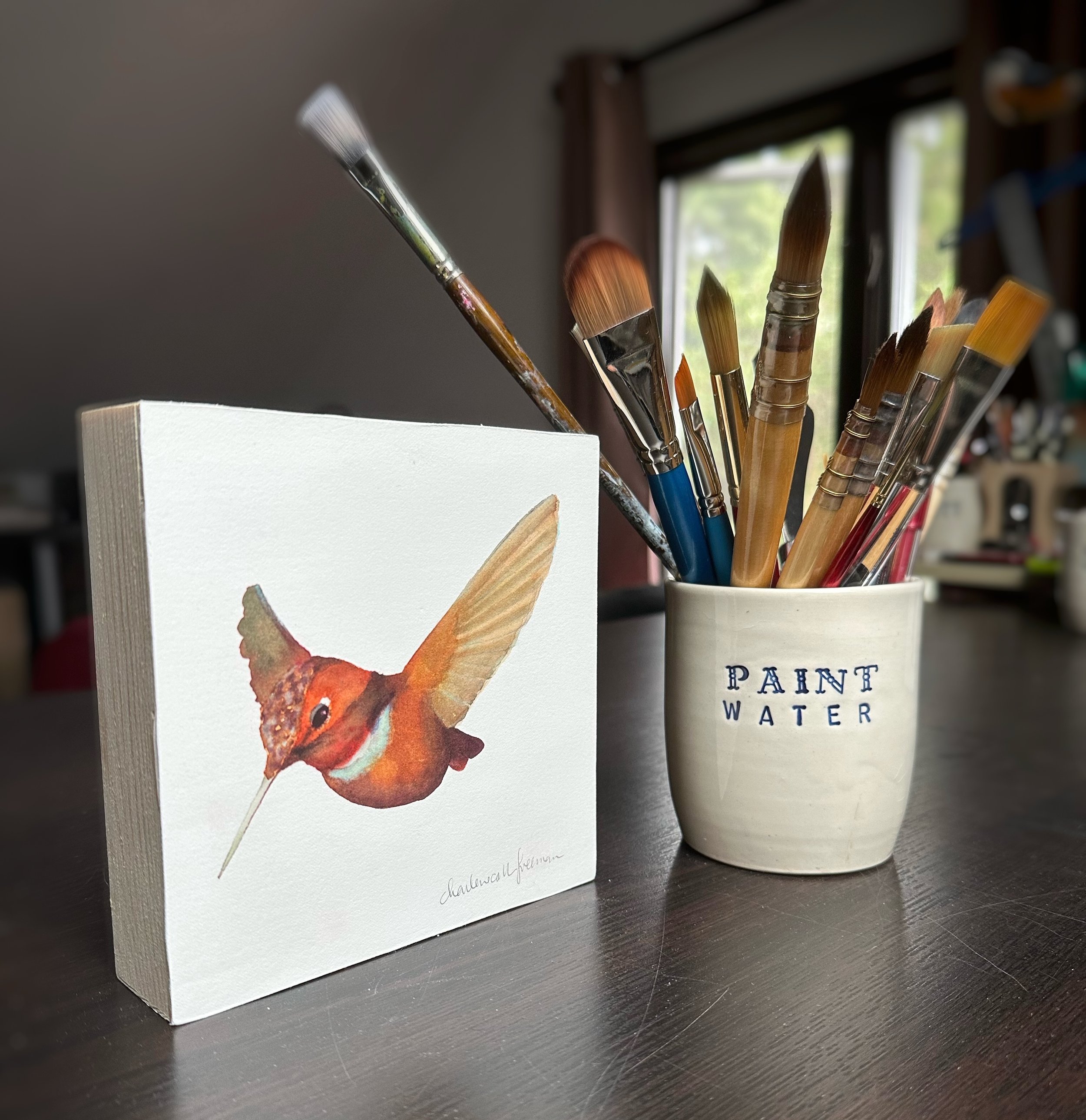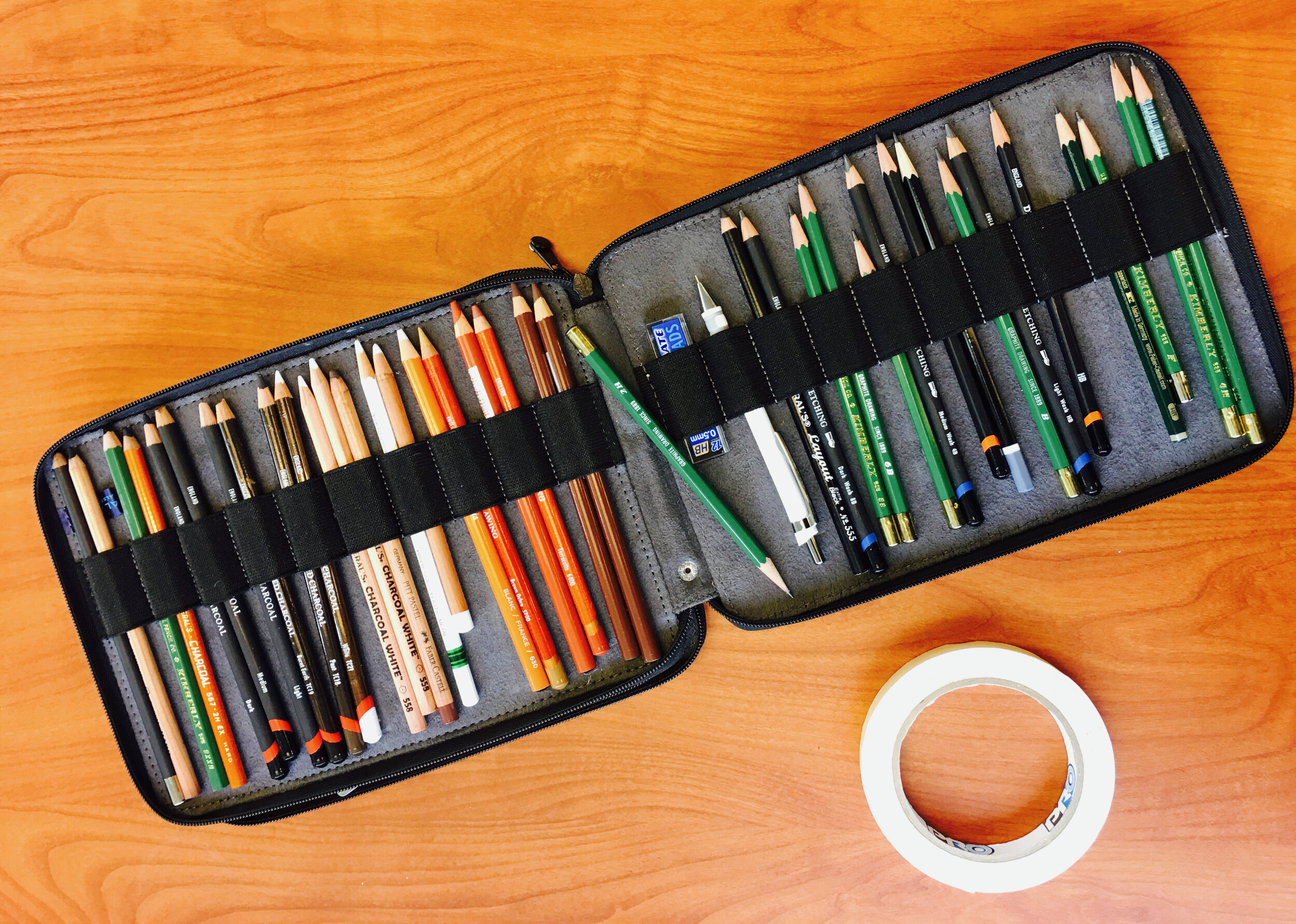Shopping for art supplies and books is one of the best things about being an artist but it can also be overwhelming if you haven't figured out your favorites yet. Below is a list of watercolor supplies that I love and recommend. These are recommendations for paintings, not for sketching. If you are looking for sketching supplies, please click here.
I spend a lot of time answering questions about art supplies in general so I put together this video to cover basic information about: watercolor paper, watercolor brushes, palettes, watercolor paints and some miscellaneous studio supplies I use all the time. This is the link to the video: https://youtu.be/70BL589bniU
I have divided my recommendations into two categories. One, for the absolute beginner who doesn’t want to invest too much at the start. I still recommend professional grade paints and paper but this entire set up is under $200 and gives you enough to go on for exploring watercoloring. Click here to see my recommendations for this kit.
The other category is for people who want to have a set up similar to mine, or at least, to start setting up your studio with supplies like mine. This list of supplies can seem overwhelming. You don’t need to buy everything I list. You can start with just the supplies on this list that I've marked with an asterisk *.
I hope this helps you decide what you want to buy and what you can wait to buy.
You can click on any item listed to go to a link on Amazon.com. As an Amazon Associate I earn from qualifying purchases but the price from Amazon remains the same for you.
Palettes
I like palettes with plenty of deep wells for my paints. I have a ceramic palette at home. It's nice and heavy and a joy to paint with. But I also have several plastic palettes. They are easier for transportation and less expensive. There are many choices out there and these are just two suggestions.
I recommend this circular palette but you can use any palette you already have if you prefer. *
Ceramic Palette
Paper
I recommend Arches paper. It is more expensive than a lot of other options out there but the results are sooo much more satisfying. Inexpensive papers are made from pulp, while good papers are made from cotton or linen. Stay away from any paper lighter than 140 lbs. My ideal paper is Arches, 140 lbs, or 300 lbs. Cold press is the most commonly used paper and watercolor paint loves it. Rough paper has more texture to it and hot press is completely smooth. Hot press gives a completely different result and is a bit more challenging to paint on, however, for precise work (such as botanical illustrations) it is perfect since there are no bumps to make your pencil or brush skip. All papers listed here are 140 lbs. If you feel more luxurious, you could order the 300 lbs. paper. It is a dream to paint on, doesn't need stretching, and costs about twice as much...
Arches Full Sheets Cold Press
Arches Blocks Cold Press 12 x 16
Arches Blocks Cold Press 9 x 12 *
Arches Full Sheets Hot Press
Arches Blocks Hot Press 12 x 16
Arches Blocks Hot Press 9 x 12
For my landscape paintings I absolutely love:
Arches Blocks Cold Press 5.9 x 11.8
Arches Blocks Rough 5.9 x 11.8
Sketchbooks
I also recommend a watercolor sketchbook. There are a lot of sketchbook options out there! And picking one is really a personal choice, everything from the size to the type of paper. Since I work mostly with watercolors in my sketchbooks, I use sketchbooks that are specifically for watercolors (as opposed to mixed media). There are a lot of great brands out there and they come in a variety of sizes. It can be overwhelming.
Here are my favorites and at my favorite sizes:
Pentalic Watercolor Journals
Stillman & Birn watercolor sketchbooks (Beta (contains cold press watercolor paper) and the Zeta (contains hot press watercolor paper)
You should get the size that you think you will enjoy the most!
Watercolor Paint
There are hundreds of colors to choose from and you'll have an adventure experimenting with the perfect palette to match your expression. To get started all you really need is a good red, yellow and blue. I've listed my favorite starter palette colors below. These include a cool, a warm and a neutral for red, for yellow and for blue.
Below these favorite 9 colors, I have listed some of my favorite colors. Pick up as many or as few as you like. My favorite brand is Daniel Smith. Paint colors by different manufacturers can be quite different from one another, even if the names of the colors are the same. These favorites of mine are linked to Amazon.
Keep in mind that colors are a personal choice. Look around for what appeals to you! Besides Daniel Smith, other artist quality brands include: M. Graham Watercolor, Winsor & Newton Professional Watercolor, Sennelier Extra-Fine Watercolor and Schmincke.
The essential nine colors:
Daniel Smith Quinacridone Rose *
Daniel Smith Transparent Pyrrol Orange *
Burnt Sienna *
Daniel Smith New Gamboge *
Daniel Smith Hansa Yellow Light *
Yellow Ochre *
Daniel Smith Phthalo Blue Green Shade *
Daniel Smith French Ultramarine *
Indigo *
Some other favorites of mine...
Quinacridone Gold
Cadmium Red Medium Hue
Alizarin Crimson
Quinacridone Magenta
Quinacridone Purple
Prussian Blue
Manganese Blue Hue
Cobalt Teal Blue
Phthalo Turquoise
Sap Green
Green Gold
Undersea Green
Brushes
There are brushes for watercolors, for oils, for acrylics, for pastels, etc.... Be sure you buy brushes that are for watercolors.
There are natural fiber brushes, synthetic brushes, and brushes that are a mix of natural and synthetic fibers. And the price can vary between $2 and $200 plus!
Then there are shapes of watercolor brushes, each best suited for a particular technique.
Then there are sizes of brushes and to complicate it more, sizes aren't standard. A size 2 brush in one brand might be 3 times bigger than a size 2 brush in another brand. So there's that.
I strongly recommend a set of very small brushes for details. This set is wonderful, with 30 brushes and a vegan leather case. This set here is another good choice with a selection of 11 brushes that are all liners and riggers. Small brushes wear out more quickly than regular brushes so if you plan on painting a lot of small details, feathers, fur and long lines, know you will need to replace brushes often.
I like this Princeton set of brushes. By clicking below, you will be linked to Amazon.
Set of Brushes
And this additional brush is nice to have: Size 16
My favorite brushes are the Black Gold Quill Brush 311 series. These brushes have blended synthetic hair (medium tensile strength), with two toned lacquered wood handle. There are other brushes you may add to your collection as your skills and interests grow but these brushes will be a solid set. I do about 80% of all my painting with my Black Gold 311 Brushes. And they are FINALLY available online. Please note that Black Gold makes a lot of brushes and they are all listed on this link. I only use their Quill Brush 311 series brushes.
If you choose to explore other options, just stay away from brushes that cost less than $10/each. They will frustrate you with their shedding hairs and poor quality.
I haven’t found any scrubber brushes that I love so instead I use synthetic angled brushes, such as these. They have a perfect bristle, not to soft and not to hard. I like the angled ones but they also come in flat and round.
Other tools for a good watercolor set up are:
A stretching board — preferably 1/2" thick white gator board, about two inches bigger in both height and width than the watercolor sheet you will paint on.
Artist Tape
Masking fluid (Pébéo, or Incredible White Mask are my favorite)
I also really like this masking fluid marker and this thinner one.
Tools for applying masking fluid (these clay shapers and these ruling pens are my favorite in addition to a few cheap brushes)
Rubber Cement Pick-up (handy for removing mask)
An easel so you can draw and paint at an angle. This allows you to control washes beautifully. Although quite large, I love the SoHo Urban Artist Adjustable Drawing Board Adjustable Drawing Board (measures 19.75 x 29.5 inches). This Jullian Art Drawing Board is slightly smaller at 20 x 25 and also lovely. And an even smaller great choice, perfect for smaller paintings and sketchbook exercises is the Daler Rowney Artsphere Easel at 16.5 x 11.8 inches.
A lightbox for tracing images. Some people feel that using a light box is "cheating" but botanical art demands precise, clean drawings with little erasing and minimal smudges. For that, I do recommend a light box and specifically I recommend the AGPtek LED Light Box. It is thin enough to be able to use between pages of a sketchbook. It comes in several sizes.
Spray Bottle
Kneaded Eraser *
HB Pencil *
Water Containers (like empty yogurt containers) *
Paper Towels *
Buying supplies becomes an addiction so start with what you are comfortable getting and don't feel the pressure to buy all the favorites listed here. Happy shopping!
When you click the link for a product, you get the same low price you normally would pay on Amazon and Amazon pays me a small percentage for recommending the product.









